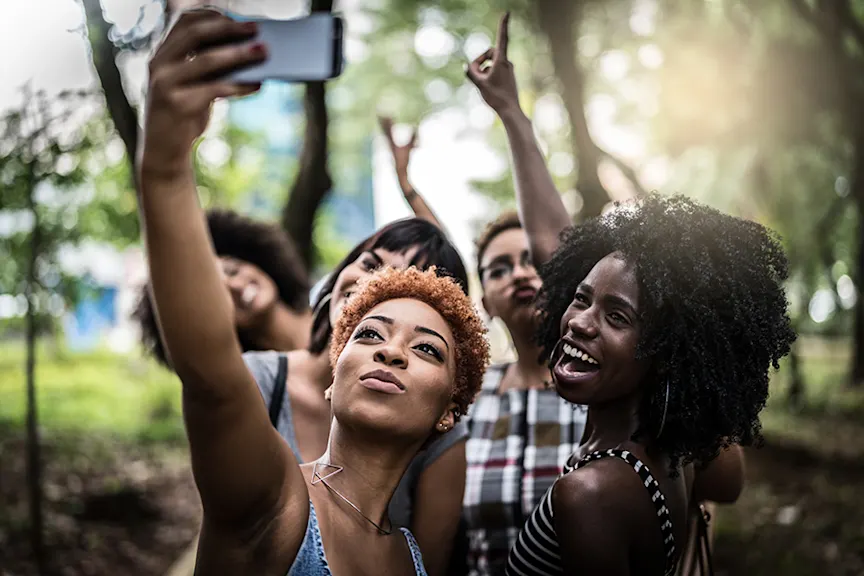7 Ways to Eliminate Mental Health Stigma in the Black Community
Now more than ever, it’s important to talk about how you’re feeling.

Right now isa very important time to focus on black mental health. Not because of an awareness month or ulterior motive. The events that have taken place in the first half of 2020 have been unprecedented in so many ways, especially for the black community.
We started the year with the tragic death of NBA legend Kobe Bryant and his young daughter. This hit people really hard, especially in the black community. Even people who weren’t basketball fans or fans of Kobe felt the impact. It created an unsettled feeling in many as we tried to grip such an unexpected loss.
Then, before we knew it, the COVID-19 pandemic began. People everywhere found their lives turned upside-down, but people of color have been disproportionately impacted, not only by the virus but by the economic crisis that resulted as stay-at-home orders were put in place.
If that wasn’t enough to deal with, we had to witness another senseless killing of a black man, George Floyd, due to police brutality. The trauma of that event has impacted not only those in the black community, but people around the world. Racism has been at the forefront of the media as both peaceful protests and violent riots have taken place across the country, and it’s raised a lot of difficult emotions. I know for me, as a black man, I’ve had my own challenges with racism. We’ve all experienced it, even if our individual stories differ, and it affects each of us in different ways.
As I listen to other people of color, there’s a wide range of emotions that they’re experiencing. It’s heavy. It’s tough to navigate. The issues coming up were already there, but the incident with George Floyd and the aftermath have brought it all to the surface. Hopefully, this will lead to important changes moving forward.
In order to get through this time—in order to make change happen in our lives and our country—it’s really important that we take care of our emotional wellness. And in order to do that, we need to address the stigma that surrounds minority mental health.
One of my main goals in the work that I do as an author and mental health speaker is totransform the stigma around mental healthby bringing it into the conversation. While there is a stigma in all of society, there are some unique issues that magnify it in the black community, and it seriously needs to be addressed—now more than ever.
TheNational Alliance on Mental Illness (NAMI) websitesays, “According to the Health and Human Services Office of Minority Health, African Americans are 20 percent more likely to experience serious mental health problems than the general population.” They also go on to explain that while 40% of whites seek care for mental health issues, only 25% of African Americans reach out for help.
Before the events of 2020 unfolded, I discussed the stigma around mental health in the black community with Imade Borha, the founder of the websitedepressedwhileblack.comand a friend of mine. We came up with seven tips that we believe will truly help people beat the stigma surrounding mental health and get on the road to recovery. And with all that’s going on in our country, now is the time to give self-care and mental wellness your best effort. Let’s get to work!
1. Prioritize Peace of Mind Over Material Things
一件事Imade bla和我都观察到ck culture is that there’s too much time, effort, and money spent on trying to impress one another. This can be done in the form of a flashy appearance or subtle bragging, and it’s all done with good intention. However, according to Imade, these actions are actually rooted in slavery.
She believes that black people were traumatized by the scarcity our ancestors experienced in slavery. With very few material items of their own, our slave ancestors would obsess over the material excess they observed among slave masters. This obsession was passed down from generation to generation, placing a priority on external appearance over internal happiness.
Here’s what you can do:If you have extra spending money beyond your basic needs and you’re thinking of buying something material, treat yourself to therapy instead.
2. Normalize Treatment, Not Mental Distress
It’s important that we learn how to use language around mental health. For example, when people of color have conversations about depression, you may not hear them using the worddepressed. Instead, they’ll talk about things liketired, exhausted,orsad. “By not calling a symptom or condition by its proper medical term, mental distress is actually being normalized,” Imade believes.
A first step to turning this around is to become more aware of our tendency to both celebrate and trivialize mental distress. We may laugh about the neighborhood alcoholic named Sparkles. Everyone knows Sparkles by name. But at the end of the day, Sparkles needs help, and he’s not getting it because people are not seeing the problem for what it truly is. In other words, we’ve normalized his mental distress, but not the treatment he needs.
Here’s what you can do:Research and learn about mental health disorders and start using the appropriate words. There is an app called The Safe Place that was created to help educate the black community about mental health disorders.
3. Redefine “Strong”
As a black man, this tip really hits home with me. We love to use the terms “strong black man” and “strong black woman.” Like many other cultural habits, it comes from good intentions. But it’s really important that we widen the definition of what that means.
When it comes to mental health, being strong doesn’t mean that you don’t need help. Instead, being strong means being able to ask for help when you need it. Once someone is able to get the help that he or she needs, things begin to change for the better.
Here’s what you can do:Learn where you can go for mental health support. The websitetherapyincolor.orgwas created as a place where black people can come together, address mental health challenges, and heal together. You can also call free mental health hotlines to find out what resources are available in your local area.
4. Shine a Light on Mental Wellness Role Models
People learn by example and for that reason, we need more role models in the black community who are talking about mental health. For instance, we have NFL player Brandon Marshall, Michelle Williams ofDestiny’s Child, Mariah Carey, and one of my favorites,Chirlane McCray, the First Lady of New York City. She is a huge advocate for mental health and speaks openly about the challenges that her family has struggled with.
When we have role models that are inserting mental health in the conversation, it helps us feel less alone and reminds us that other people have the same internal battles that we do.
Here’s what you can do:If you’ve received help for a mental health challenge in the past, share your story in your community. Become the role model that someone else needs in order to take the step of reaching out to get help.
5. Make Resources More Accessible
There are many resources around mental health, like HealthCentral. But we need to spread the word and make them easily accessible in the black community, so people know what symptoms of mental illness look like, and where to go for help. A few other good websites areTherapy for Black GirlsandTherapy for Black Boys. Mental wellness in the black community starts by providing educators and people in positions of power with resources about mental health treatment.
Here’s what you can do:Go online and type in what you’re feeling (depressed, angry, anxious…) and start reading. Helpful hint: Websites that say “.org” after their name are often (but not always!) well-established organizations that provide quality info. If you need more options, I created a list ofanxiety resourcesthat you can check out as well.
6. Provide Free Therapy in Black Communities
According toThe Brookings Institution, “large gaps in median household income persist between blacks and the rest of America.” On average, there is a $10,000 difference between the incomes of black people and white people. This discrepancy makes it difficult for black people to have access to the same mental health treatment that whites have, if any treatment is even available in their community.
这就是为什么它是如此重要,我们想办法get free high-quality therapy into the black community that can be immediately accessed. I don’t necessarily think it needs to be government funded—individual non-profit organizations focused on bringing mental health care to communities could also help. Ultimately, having easier access is a necessary step toward giving people the tools to empower themselves and helping the black community rise.
Here’s what you can do:If you’re a mental health professional, explore your options for how to offer your services pro bono a few hours a week. If you’re not a mental health professional, talk to local nonprofits in your area and work together to bring a mental health counseling program into the community.
7. Be an Example of Self-Care in Your Community
Embracing self-care is the final step and one of the most important actions toward breaking the stigma of mental health in the black community. “We need to live as the example of what self-care is so others can see that example,” says Imade. Leading by example will help you navigate your mental health challenges while showing the people in your life ways they can take steps toward their own mental wellness.
Part of that means making sure people know it’s safe to talk about their issues. “People need to know that it’s okay to discuss things,” says Imade. “In a safe space, there’s no shaming, no blaming, and no cutting off the conversation.” Many people of color have enough obstacles to overcome to address their mental health—you don’t need to be one of them.
Here’s what you can do:It’s important to remember that self-care looks a little different to each person. Here are a few ways to prioritize wellness: Exercise regularly and make healthy food choices; take your medication as prescribed; go to therapy when needed; be open about your challenges with your family;stop stigmatizing others.
One Final Note
You have been living through trauma this year even if you’ve never experienced it in the past. This may be a new experience for you. Or this may be the first time you’re really trying to address your mental health. Remember, when your emotions are high and you’re angry, you’re not going to make the best decisions on how to move forward. Sometimes we think showing our anger will make change happen, but it can also exhaust us and burn us out.
当你浏览这个艰难的时刻,我鼓励you to learn how to sit with the feelings that you have as you look at the news or interact with people who are not in the black community. It’s important to be aware that conversations are happening that could trigger you. It’s really important to be in touch with those emotions and get help when you need it. If you’re feeling really overwhelmed and like you can’t handle this, reach out to a mental health hotline ASAP.
I also encourage you to have real conversations with people who are different from you. We may never fully understand people who are not the same as us—men and women have been trying to do it for thousands of years and it’s still a challenge! But we can always make the attempt, and that’s what counts.





